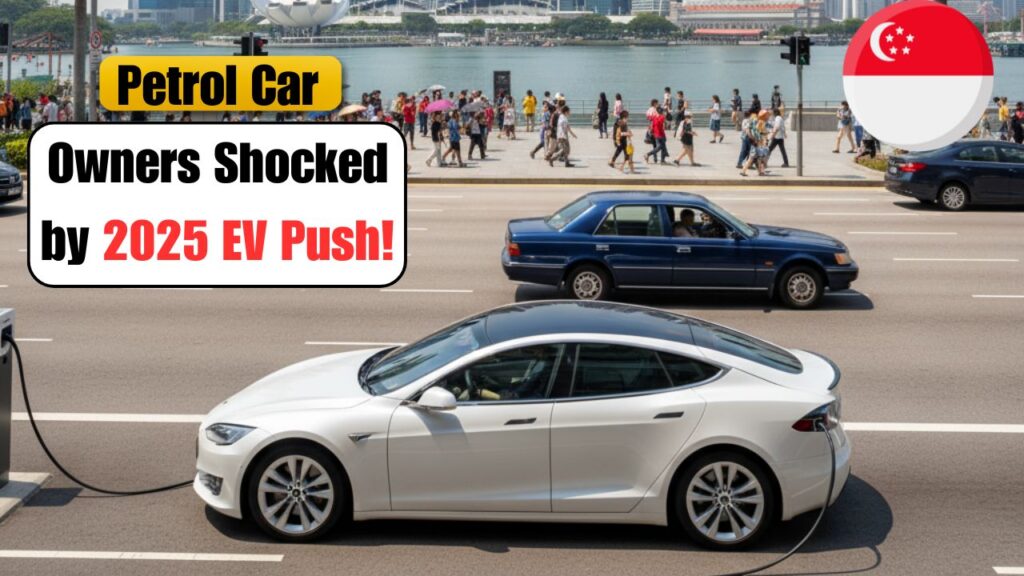Singapore Push for Electric Cars – Singapore is accelerating its green transformation by promoting electric vehicles (EVs) as part of its long-term sustainability goals. The government has announced several measures effective from 2025 that will directly affect petrol vehicle owners. With higher road taxes, stricter emissions rules, and limited registration for new petrol cars, Singapore aims to phase out internal combustion engine vehicles by 2040. Petrol vehicle owners must now plan for these changes by exploring EV options, government rebates, and charging infrastructure developments that will shape the nation’s eco-friendly transportation system.

Singapore’s Electric Car Revolution: 2025 Policies and Plans
The Singapore government has launched a strong push toward electric mobility through the Electric Vehicle Early Adoption Incentive and the Vehicle Emissions Scheme (VES). From 2025, petrol and diesel car registrations will face higher fees, while EVs enjoy rebates of up to S$25,000 under the VES. In addition, over 60,000 charging points are expected to be operational by 2030, easing range anxiety. The Land Transport Authority (LTA) is working closely with private developers to expand charging infrastructure across HDB carparks, malls, and workplaces, making EV adoption more convenient and accessible.
 Aussies Shocked as ANZ Fined $240 Million – 65,000 Customers Impacted in 2025 Trust Breach Scandal
Aussies Shocked as ANZ Fined $240 Million – 65,000 Customers Impacted in 2025 Trust Breach Scandal
What Petrol Vehicle Owners Must Do Before 2025
Petrol vehicle owners in Singapore need to assess the rising operational costs due to higher road taxes and stricter emissions-based surcharges. Many drivers are considering selling their petrol vehicles before resale values drop. Switching to hybrid or fully electric cars is a smart option to benefit from rebates and avoid penalties. Owners should also explore government-backed EV financing and charging station installation grants for residential and commercial areas. Staying updated on LTA policies will ensure a smooth transition without facing sudden costs or compliance issues.
Electric Vehicle Grants and Charging Infrastructure Expansion
The government’s push for EV adoption is supported by new grants for public charging infrastructure. The Electric Vehicle Common Charger Grant (ECCG) provides co-funding for installing chargers in private residential properties, encouraging early adoption. Petrol vehicle owners can leverage this to plan ahead and install chargers in condominiums or workplaces. The expansion of fast-charging networks at Shell Recharge and SP Mobility stations will also reduce waiting times. As a result, driving an EV in Singapore is becoming more affordable, practical, and sustainable than ever before.
Preparing for the Future: Singapore’s Green Mobility Vision
Singapore’s vision of becoming a clean and smart transport hub relies heavily on electrification and digital innovation. By 2030, the country expects a major reduction in carbon emissions, with all newly registered cars being cleaner-energy models. Petrol car owners who act early can save thousands through rebates and avoid future bans or taxes. Transitioning to EVs isn’t just about following regulations—it’s about contributing to a sustainable and efficient transportation system that benefits both citizens and the environment.
FAQs
Q1. What is the main goal of Singapore’s electric car policy for 2025?
A1. To phase out petrol vehicles and promote electric mobility for cleaner air and sustainability.
Q2. Are there rebates for buying electric cars in Singapore?
A2. Yes, rebates of up to S$25,000 are available under the Vehicle Emissions Scheme.
Q3. Can petrol vehicles still be used after 2025?
A3. Yes, but they will face higher taxes and stricter emissions rules.
Q4. How many charging stations will Singapore have by 2030?
A4. Over 60,000 charging points will be installed nationwide by 2030.
How is Singapore incentivizing electric cars over petrol vehicles by 2025?
By offering subsidies, rebates, and increasing charging infrastructure.







